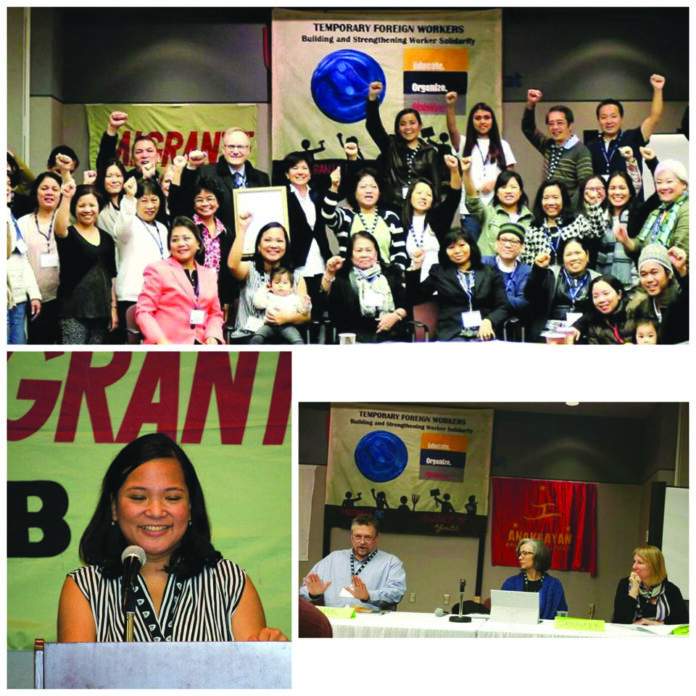I was proud to be part of the Migrante BC-led conference at the Unifor Hall in New Westminster last Dec 3-4. Excellent speakers and panelists, very good turnout from progressive unions and community groups, great food (as usual!), useful workshop sessions, nice mix of young and veteran activists and inspiring themes of forging solidarity among workers using education, mobilization and organization.
The Temporary Foreign Workers (TFW) Conference carried the theme of “Building and Strengthening Workers Solidarity.” It brought together various unions, community groups, community advocates, migrant youth, veteran activists and men and women migrant workers.
The event itself was hugely significant firstly, because it was organized and led by migrant workers and migrant organizers. It echoed the motto of the International Migrants Alliance, the first-ever global alliance of migrants and their families, that declared, quite powerfully and with pride, that “for too long, others have spoken on our behalf, now we speak for ourselves.”
Secondly, because the Conference happened at a time when anti-migrant sentiments are on the rise world-wide, e.g. the Brexit vote in the UK , the Trump election in the United States, and anti-migrant rhetoric of Marie Le Pen, France’s far-right National Front leader. And right here in Canada, the recent review of the TFW Program excluded many migrant workers’ voices and issued recommendations that would make it easier for employers to hire TFWs but kept silent on the situation and demands for landed status by migrant workers.
Prof Ethel Tungohan, Political Science professor at York University and a community activist, declared in her keynote address that 2016 was a horrible year for migrant workers, but she also delivered the message of hope from the organized mass movements of migrant workers, of ordinary people. “Let’s remember that migrant workers’ active and concerted campaigning is the reason policy improvements were given in the first place. These improvements were never given to us out of the goodness of the government’s hearts. These were given because we fought for them.”
While most discourse on TFWP just covers the commodification of workers in Canada, the conference panel not only reviewed the racist treatment of migrants in Canadian history and the shift from pathways to citizenship to the recruitment of guest workers, but also tackled the Philippine government’s Labour Export Policy that pushes Filipino workers out of the country to work in the global North. Dr. Chandu Claver summed it with “Migration should be a choice, not a necessity.” Migrant workers brought this point home so clearly when former caregiver Avelina Vasquez, Cholo Sales, former worker at Denny’s Restaurant, caregiver Hessed Torres, Mildred German, child of a migrant worker, and Gabriel Allahdua, farm worker from the Carribean all told their heart-wrenching stories of struggle and hope and how the human spirit survives in the face of adversity.
On the second day, the multi-generational activists and trade union leaders inspired the audience, especially the youth, with their personal experiences and hard learned lessons in the struggle ,without losing the sense of humour which is necessary to have always! They were Elsie Dean, community and peace activist in her 90s, Marion Pollack, a retired union activist with the Postal Workers Union and Harsha Walia, social justice activist from No One Is Illegal and a mother.
Grassroots organizing in the local workplace, in communities and neighbourhoods, in countries in the North and the source countries in the South meant using the tools of educating, mobilizing and organizing in inter-connected ways. The young workers made a good impression with their work in organizing: Kari Michaels from BCGEU, Mildred German from Migrante BC Youth, Marikit Saturay from AnakBayan Europe, and Einstein Recedes from AnakBayan Philippines.
Labour leaders Joey Hartman, President of Vancouver and District Labour Council (VDLC) , Jennifer Whiteside of the Hospital Employees Union (HEU) , and Mark Olsen of the Labourers’ International Union (LiUNA) spoke very strongly about the current labour movement and the fight for all workers’ rights. The key words raised were partnerships, as “peers, as allies” and while all agreed that unions and migrant workers have a long way to go to achieve “decent work and social protection for all workers”, the solidarity is there and continues to expand and strengthened in the process of struggle. The history of the Canadian labour movement has not always been stellar with its scapegoating of migrant workers in its past but the labour unions at this conference emphatically said that they would make sure that they were “on the right side of history at this time. “
The conference was about workers coming together. Dr. Tungohan captured this with her words: “we really need to come together, to cast aside political and personal differences, and see the importance of working towards justice for migrants, justice for workers, and justice for people. The people united will never be defeated/ Ang tao, ang bayan, ngayon ay lumalaban.
Tinig Migrante by E. Maestro



